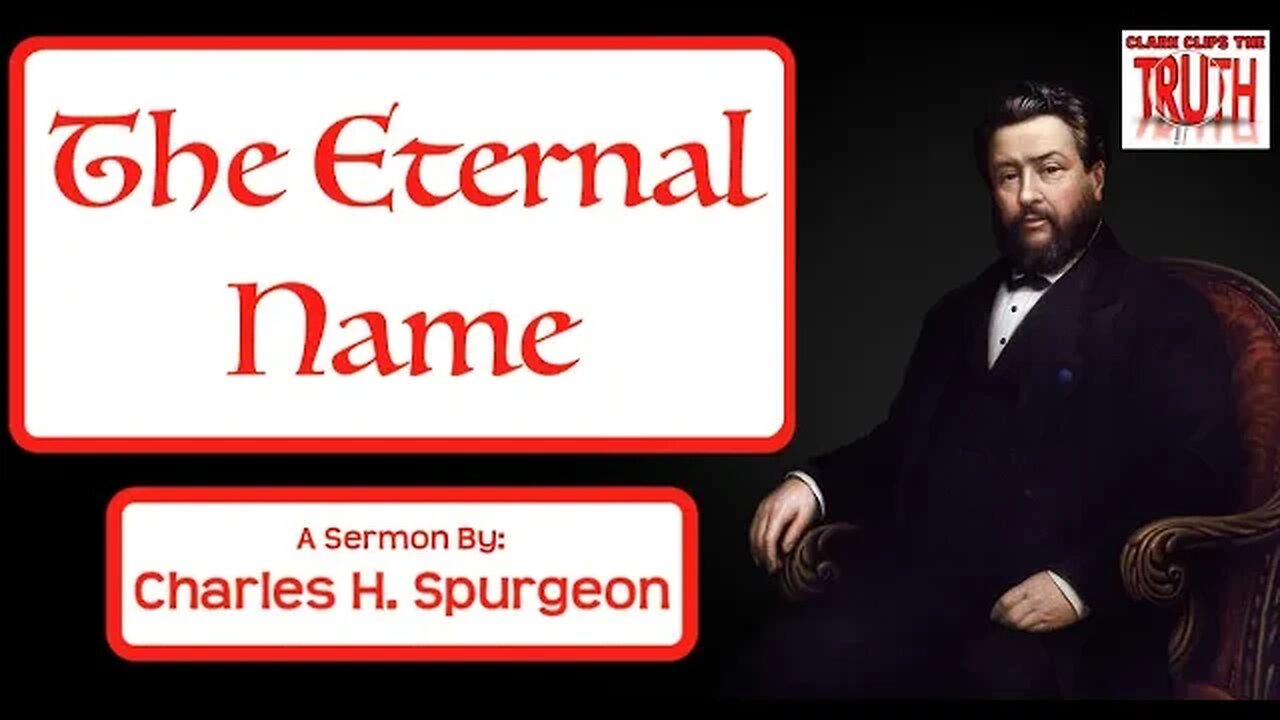Premium Only Content

The Eternal Name | Charles H Spurgeon Sermon
The Eternal Name | C H Spurgeon Sermons | Audio Sermon
The Eternal Name
Charles Haddon Spurgeon May 27, 1855
Scripture: Psalms 72:17
From: New Park Street Pulpit Volume 1
"His name shall endure for ever."—Psalm 72:17
No one here requires to be told that this is the name of Jesus Christ, which "shall endure for ever." Men have said of many of their works, "they shall endure for ever;" but how much have they been disappointed! In the age succeeding the flood, they made the brick, they gathered the slime, and when they had piled old Babel's tower, they said, "This shall last for ever." But God confounded their language; they finished it not. By his lightnings he destroyed it, and left it a monument of their folly. Old Pharoah and the Egyptian monarchs heaped up their pyramids, and they said, "They shall stand for ever," and so indeed they do stand; but the time is approaching when age shall devour even these. So with all the proudest works of man, whether they have been his temples or his monarchies, he has written "everlasting" on them; but God has ordained their end, and they have passed away. The most stable things have been evanescent as shadows, and the bubbles, of an hour, speedily destroyed at God's bidding. Where is Nineveh, and where is Babylon? Where the cities of Persia? Where are the high places of Edom? Where are Moab, and the princes of Ammon? Where are the temples or the heroes of Greece? Where the millions that passed from the gates of Thebes? Where are the hosts of Xerxes, or where the vast armies of the Roman emperors? Have they not passed away? And though in their pride they said, "This monarchy is an everlasting one; this queen of the seven hills shall be called the eternal city," its pride is dimmed; and she who sat alone, and said, "I shall be no widow, but a queen for ever," she hath fallen, hath fallen, and in a little while she shall sink like a millstone in the flood, her name being a curse and a byword, and her site the habitation of dragons and owls. Man calls his works eternal—God calls them fleeting; man conceives that they are built of rock—God says, "Nay, sand, or worse than that—they are air." Man says he erects them for eternity—God blows but for a moment, and where are they? Like baseless fabrics of a vision, they are passed and gone for ever.
#SpurgeonSermon #Spurgeon #Puritan
********************************************************
Please Note: Whenever possible, please support the original content creator before supporting me. With that said, if you find value in the small service that I provide (i.e., searching out the Truth and directing my audience to phenomenal content and channels) and if you feel led...
Please Help Support "Clark Clips the Truth" Ministry:
Like. Share. Comment. Subscribe. Pray.
Venmo: https://www.venmo.com/u/ClarkClips
Patreon: https://www.patreon.com/clarkclips
Thank you so much and may God Bless You Abundantly!
********************************************************
Also, Please Support the Creator of This Audio Recording, "Koelsch Broadcasting Productions." Thanks and God Bless!
Source:
Prince of Preachers
Phone: (864) 404-1542
Koelsch Broadcasting Productions
5 Scottswood Rd.
Greenville, SC 29615
https://www.sermonaudio.com/solo/pop/sermons/2201163452/
CONTACT: https://www.sermonaudio.com/solo/pop/contact/
ABOUT:
We are a radio broadcast located in Koelsch Broadcasting Productions.
Charles Haddon Spurgeon (1834-92) was England's best-known preacher for most of the second half of the nineteenth century. In 1854, just four years after his conversion, Spurgeon, then only 20, became pastor of London's famed New Park Street Church (formerly pastored by the famous Baptist theologian John Gill). The congregation quickly outgrew their building, moved to Exeter Hall, then to Surrey Music Hall. In these venues Spurgeon frequently preached to audiences numbering more than 10,000—all in the days before electronic amplification. In 1861 the congregation moved permanently to the new Metropolitan Tabernacle.
-
 1:02:42
1:02:42
Donald Trump Jr.
8 hours agoMAHA Means Business, Interview with Calley Means | TRIGGERED Ep.237
87.1K43 -
 LIVE
LIVE
Joker Effect
39 minutes agoWhy aren't you trying to enjoy yourself? Live a little!
375 watching -
 LIVE
LIVE
NeoX5
2 hours agoTyping of the Dead | Don't Be Afraid 2 | Rumble Gaming
57 watching -
 57:50
57:50
BonginoReport
5 hours agoFAKE News In A Downward Ratings Spiral - Nightly Scroll w/ Hayley Caronia (Ep.36)
73.6K38 -
 7:58:02
7:58:02
Dr Disrespect
10 hours ago🔴LIVE - DR DISRESPECT - TRIPLE THREAT CHALLENGE - WZ, PUBG, FORTNITE
154K12 -
 1:28:36
1:28:36
LIVE WITH CHRIS'WORLD
7 hours agoLIVE WITH CHRIS’WORLD - HERE IS THE KEY TO 100 DAYS OF SUCCESS!
9.36K8 -
 1:54:45
1:54:45
Wayne Allyn Root | The Root Reaction
4 hours agoThe Root Reaction | 28 April 2025
13.5K1 -
 55:51
55:51
LFA TV
1 day agoThat Big, Beautiful Wall Around the Vatican | TRUMPET DAILY 4.28.25 7PM
11.8K2 -
 1:19:06
1:19:06
Kim Iversen
6 hours agoEpstein Victim DEAD at 41, Ruled Suicide. Suspicious? | The Left DOUBLES DOWN on Extremism
65.4K34 -
 2:38:55
2:38:55
vivafrei
12 hours agoLive with Myron Gaines - from Global Politics to the "Manosphere" & Everything in Between
105K85